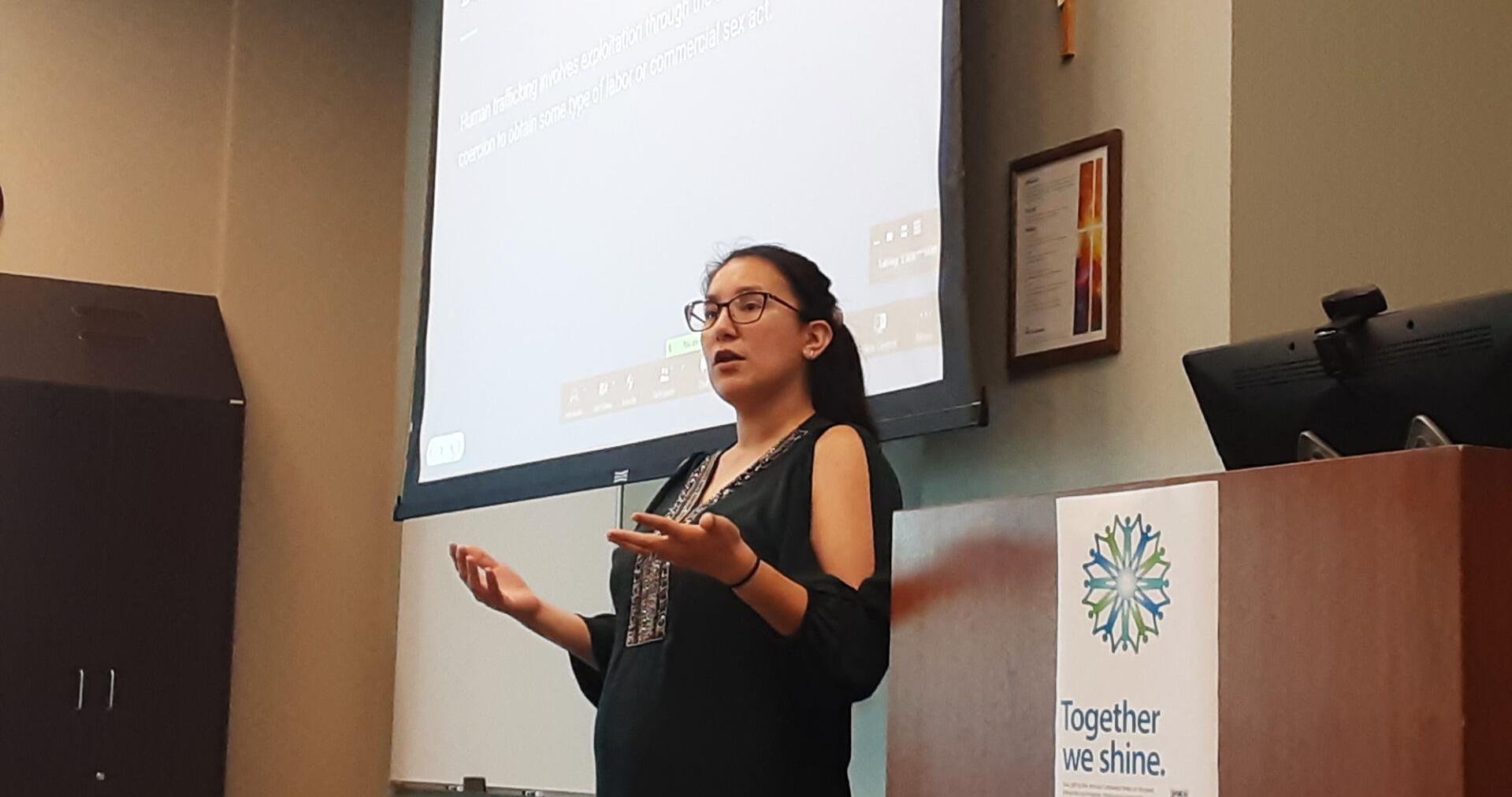Grand Island Trafficking Coalition relaunches amid rising digital misinformation

Grand Island Area Coalition on Trafficking is being relaunched.
A luncheon for GIACT members held at CHI Health St. Francis Wednesday brought together representatives from multiple local agencies, including Hall County Attorney's Office, Grand Island YWCA, Willow Rising, Heartland United Way and more.
GIACT's mission is to coordinate efforts as community partners, educate and raise awareness about human trafficking.
The coalition, formed in 2018, hopes to increase community participation following a period of only limited activity due to the COVID-19 pandemic.
Human trafficking involves exploitation through the use of force, fraud or coercion to obtain some type of favor or commercial gain, explained Allie Trautman of Hastings-based enCourage Advocacy Center.
Trafficking isn't how it's shown in movies and on TV, said GIPD Crime Analyst Jessica Hoback at Wednesday's event.
A woman isn't suddenly swept into a van and transported to Russia, for example.
Hoback and GIACT are working to change such pervading misconceptions.
“There are social media posts about, ‘Oh, my gosh, I was followed from the store and I thought I was going to be trafficked.' And the same is posted the day before in a different city, with a different store,” said Hoback. “Those are the things that spread like wildfire. That makes it's difficult for us.”
Such “fearmongering” makes Hoback cringe, she said.
“Some of those things that have been shared on social media have been investigated by the police and been found to be untrue,” she said. “If someone's following you around the store, they might just need the same cereal as you. It doesn't mean you're going to be trafficked.”
This misinformation can have a real effect.
“I know women who will not come to Grand Island without their husband because they don't want to be trafficked,” said Hoback. “To me, that's heartbreaking because Grand Island is not that dangerous of a community. I feel very safe living here.”
GIACT focuses on both sex trafficking and labor trafficking, said Trautman.
“With labor trafficking, anybody can be a victim,” she said. “Same with sex trafficking, though we do see that women are a more vulnerable population. Such as with race, people who are minority groups are more often targeted for both sex and labor trafficking.”
With sex trafficking, younger individuals are initially recruited, explained Trautman. For the majority of people brought into trafficking, it is done through family members or by an intimate partner.
“It's people who have access to that person, not strangers,” she said. “I'm not saying it can't happen, but we need to be aware because we need to be protecting those people from the people who are closest to them.”
In Hall County recently, sex traffickers were successfully prosecuted and sentenced to 20 to 40 years in prison, said Hoback.
Recent cases prosecuted by GIPD have not involved advertising for prostitution.
Two recent convictions were based on “victims who were provided or fed drugs for their addiction,” said Hoback.
“When someone asks, ‘Why didn't you just leave? You weren't locked up in a basement.' That was their source for the drug they needed for their addiction, so they stuck around,” she said. “We're not seeing people locked up in basements and being sold in an alley, like you might see on TV.”
People who witness strange or alarming activity should report the information directly to their local law enforcement agencies, said Nebraska State Patrol Lt. Brent Bockstadter.
The National Human Trafficking Hotline (at 1-888-373-7888) does not always forward tips and information to local agencies.
“Their fine print says, unless there is active force or an active force, or the victim has consented to the hotline to release the information to law enforcement, that's not getting funneled to law enforcement,” said Bockstadter.
He added, “If you see something, you need to call local law enforcement.”
A new tipline is being readied by NSP, said Bockstadter, which will serve the entire state.
GIACT meetings are open to the community.
For more information, visit www.heartlandunitedway.org/grand-island-area-coalition-trafficking or email [email protected].
Those interested can also visit facebook.com/GrandIslandACT.
This “Eyes on Trafficking” story is reprinted from its original online location.
 ABOUT PBJ LEARNING
ABOUT PBJ LEARNING
PBJ Learning is a leading provider of online human trafficking training, focusing on awareness and prevention education. Their interactive Human Trafficking Essentials online course is used worldwide to educate professionals and individuals how to recognize human trafficking and how to respond to potential victims. Learn on any web browser (even your mobile phone) at any time.
More stories like this can be found in your PBJ Learning Knowledge Vault.
EYES ON TRAFFICKING
This “Eyes on Trafficking” story is reprinted from its original online location.
ABOUT PBJ LEARNING
PBJ Learning is a leading provider of online human trafficking training, focusing on awareness and prevention education. Their interactive Human Trafficking Essentials online course is used worldwide to educate professionals and individuals how to recognize human trafficking and how to respond to potential victims. Learn on any web browser (even your mobile phone) at any time.
More stories like this can be found in your PBJ Learning Knowledge Vault.
